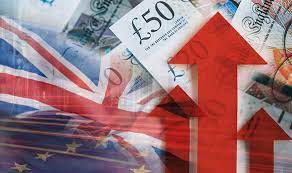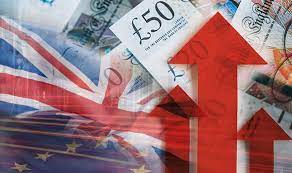
Official estimates reveal that the UK economy grew by 7.5 per cent last year, despite a drop in December owing to Omicron limitations.
It was the fastest rate of growth since 1941, but it followed a 9.4 percent drop in 2020 when the epidemic pushed portions of the economy to close.
The economy declined 0.2 per cent in December as Omicron restrictions impacted the hotel and retail industries.
Chancellor Rishi Sunak described the economy as "remarkably resilient."
According to the Office for National Statistics (ONS), growth was 1% in the last three months of 2021, which ONS director of economic statistics Darren Morgan described as "quite strong" given Omicron's spread.
Many economists had predicted 7.3 per cent growth for the year and a 0.5 per cent decrease in December, but the ONS figures outperformed their expectations.
Morgan told the BBC that the UK's expansion in 2021 indicated it was the fastest expanding economy in the G7 group of nations, but he cautioned against drawing too many conclusions.
"The growth in 2021 comes from a low base in 2020 when the economy fell sharply," Morgan said. "And if you look at where the UK economy is now, compared to its pre-pandemic level, which I know a lot of people do for a broader picture of the economy, the UK is middle of the pack, compared with the G7."
Using this comparison, he stated that the US, Canadian, and French economies were superior to the UK's, while the UK was superior to Italy, Germany, and Japan.
The worst of the pandemic's economic impact is now behind us, but the aftershocks continue.
Downing Street is unlikely to pass up the chance to brag about 2021. Having hosted the G7, the United Kingdom has now been acknowledged as the major nations' fastest-growing economy.
However, such comparison requires a substantial amount of context.
The UK economy's 7.5 per cent growth in 2021 is the highest of the G7 major countries, indicating a strong rebound.
As the ONS notes, this should be evaluated with the UK's highest drop of 9.4 percent compared to those same economies in 2020.
In comparison to the US, France, and Canada, the economy is still slightly smaller than it was at the end of December 2019. On a little more timely basis, utilizing monthly statistics that other countries do not have, the UK economy is greater than it was in February 2020.
The UK economy expanded by 1 per cent in the fourth quarter of 2021, slightly lower than expected, as the spread of the Omicron variant of the coronavirus weighed on the economy in December.
However, as is often the case during these remarkable times, this appears to be a reflection of events.
Looking ahead, the biggest problem for the economy in 2022 is the severe cost of living squeeze, with energy and other expenses contributing to declines in average living standards.
According to the ONS, despite the December drop, GDP was in line with its pre-coronavirus level in February 2020 on a monthly basis.
However, GDP in the October-December quarter was 0.4 per cent lower than in the final three months of 2019.
"Today's figures show that despite Omicron the economy was remarkably resilient. We were the fastest growing economy in the G7 last year and are forecast to continue being the fastest growing economy this year. But I know that people are worried about rising prices, particularly energy bills, and although these are global challenges of course we're going to act and that's why last week we announced a significant package of support to help millions of families meet the cost of bills," Sunak told the BBC.
(Source:www.bbc.com)
It was the fastest rate of growth since 1941, but it followed a 9.4 percent drop in 2020 when the epidemic pushed portions of the economy to close.
The economy declined 0.2 per cent in December as Omicron restrictions impacted the hotel and retail industries.
Chancellor Rishi Sunak described the economy as "remarkably resilient."
According to the Office for National Statistics (ONS), growth was 1% in the last three months of 2021, which ONS director of economic statistics Darren Morgan described as "quite strong" given Omicron's spread.
Many economists had predicted 7.3 per cent growth for the year and a 0.5 per cent decrease in December, but the ONS figures outperformed their expectations.
Morgan told the BBC that the UK's expansion in 2021 indicated it was the fastest expanding economy in the G7 group of nations, but he cautioned against drawing too many conclusions.
"The growth in 2021 comes from a low base in 2020 when the economy fell sharply," Morgan said. "And if you look at where the UK economy is now, compared to its pre-pandemic level, which I know a lot of people do for a broader picture of the economy, the UK is middle of the pack, compared with the G7."
Using this comparison, he stated that the US, Canadian, and French economies were superior to the UK's, while the UK was superior to Italy, Germany, and Japan.
The worst of the pandemic's economic impact is now behind us, but the aftershocks continue.
Downing Street is unlikely to pass up the chance to brag about 2021. Having hosted the G7, the United Kingdom has now been acknowledged as the major nations' fastest-growing economy.
However, such comparison requires a substantial amount of context.
The UK economy's 7.5 per cent growth in 2021 is the highest of the G7 major countries, indicating a strong rebound.
As the ONS notes, this should be evaluated with the UK's highest drop of 9.4 percent compared to those same economies in 2020.
In comparison to the US, France, and Canada, the economy is still slightly smaller than it was at the end of December 2019. On a little more timely basis, utilizing monthly statistics that other countries do not have, the UK economy is greater than it was in February 2020.
The UK economy expanded by 1 per cent in the fourth quarter of 2021, slightly lower than expected, as the spread of the Omicron variant of the coronavirus weighed on the economy in December.
However, as is often the case during these remarkable times, this appears to be a reflection of events.
Looking ahead, the biggest problem for the economy in 2022 is the severe cost of living squeeze, with energy and other expenses contributing to declines in average living standards.
According to the ONS, despite the December drop, GDP was in line with its pre-coronavirus level in February 2020 on a monthly basis.
However, GDP in the October-December quarter was 0.4 per cent lower than in the final three months of 2019.
"Today's figures show that despite Omicron the economy was remarkably resilient. We were the fastest growing economy in the G7 last year and are forecast to continue being the fastest growing economy this year. But I know that people are worried about rising prices, particularly energy bills, and although these are global challenges of course we're going to act and that's why last week we announced a significant package of support to help millions of families meet the cost of bills," Sunak told the BBC.
(Source:www.bbc.com)





